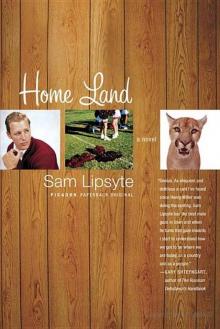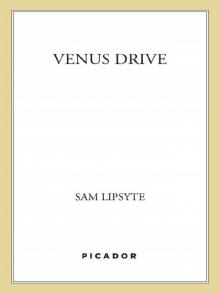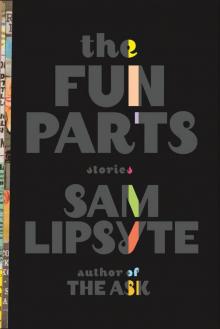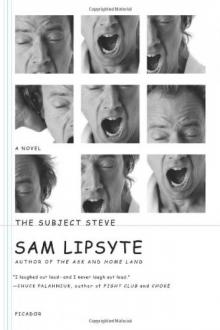- Home
- Sam Lipsyte
The Ask
The Ask Read online
The Ask
Sam Lipsyte
Milo Burke, a development officer at a third-tier university, has 'not been developing': after a run-in with a well-connected undergrad, he finds himself among the burgeoning class of the newly unemployed. Grasping after odd jobs to support his wife and child, Milo is offered one last chance by his former employer: he must reel in a potential donor – a major 'ask' – who, mysteriously, has requested Milo 's involvement. But it turns out that the ask is Milo 's sinister college classmate Purdy Stuart. And the 'give' won't come cheap. Probing many themes – or, perhaps, anxieties – including work, war, sex, class, child rearing, romantic comedies, Benjamin Franklin, cooking shows on death row, and the eroticization of chicken wire, The Ask is a burst of genius by a young American master who has already demonstrated that the truly provocative and important fictions are often the funniest ones.
Sam Lipsyte
The Ask
© 2010
For Alfred
Acknowledgments
My deep gratitude to the John Simon Guggenheim Memorial Foundation and the MacDowell Colony for their support, and to Ceridwen Morris, for her honesty, insight, and patience.
In memory of James Conlon.
One
America, said Horace, the office temp, was a run-down and demented pimp. Our republic's whoremaster days were through. Whither that frost-nerved, diamond-fanged hustler who'd stormed Normandy, dick-smacked the Soviets, turned out such firm emerging market flesh? Now our nation slumped in the corner of the pool hall, some gummy coot with a pint of Mad Dog and soggy yellow eyes, just another mark for the juvenile wolves.
"We're the bitches of the First World," said Horace, his own eyes braziers of delight.
We all loved Horace, his clownish pronouncements. He was a white kid from Armonk who had learned to speak and feel from a half-dozen VHS tapes in his father's garage. Besides, here at our desks with our turkey wraps, I did not disagree.
But I let him have it. It was my duty. We were in what they call a university setting. A bastion of, et cetera. Little did I know this was my last normal day at said bastion, that my old friend Purdy was about to butt back into my world, mangle it. I just figured this was what my worst teachers used to call a teachable moment.
"Horace," I said. "That's a pretty sexist way to frame a discussion of America's decline, don't you think? Not to mention racist."
"I didn't mention anybody's race," said Horace.
"You didn't have to."
"P.C. robot."
"Fascist dupe."
"Did you get avocado on yours?"
"Fattening," I said.
"Don't worry, baby," said Horace. "I like big women."
"What about hairy ones?" I said, parted my shirt to air my nipple fuzz. Horace let me be a cretin with him. You could call him my infantilism provider, though you'd sound like an idiot. Otherwise, I was ostensibly upstanding, a bald husband, a slab-bellied father.
"Gentlemen," said our supervisor, Vargina, coming out from her command nook. "Did you send off those emails about the Belgian art exchange?"
Horace swiveled back to his monitor with the mock panic of a sitcom serf. Vargina took scant notice of our talk, tolerated foul banter for purposes of morale. But the fact remained, we had forgotten the afternoon's assignment. The gods of task flow did not easily forgive.
Where we worked was in the development office of a mediocre university in New York City. It was an expensive and strangely obscure institution, named for its syphilitic Whig founder, but we often called it, with what we considered a certain panache, the Mediocre University at New York City. By we, I mean Horace and I. By often, I mean once.
Our group raised funds and materials for the university's arts programs. People paid vast sums so their spawn could take hard drugs in suitable company, draw from life on their laptops, do radical things with video cameras and caulk. Still, the sums didn't quite do the trick. Not in the cutthroat world of arts education. Our job was to grovel for more money. We could always use more video cameras, more caulk, or a dance studio, or a gala for more groveling. The asks liked galas, openings, recitals, shows. They liked dinner with a famous filmmaker for them to fawn over or else dismiss as frivolous.
An ask could be a person, or what we wanted from that person. If they gave it to us, that was a give. The asks knew little about the student work they funded. Who could blame them? Some of the art these brats produced wouldn't stand up to the dreck my three-year-old demanded we tack to the kitchen wall. But I was biased, and not just because I often loved my son. Thing was, I'd been just like these wretches once. Now they stared through me, as though I were merely some drone in their sight line, a pathetic object momentarily obstructing their fabulous horizon. They were right. That's exactly what I was.
A solitudinous roil, my bitterness. Horace, after all, was their age. He had no health insurance, just hope. Our rainmaker, Llewellyn, seemed born to this job, keen for any chance to tickle the rectal bristles of the rich with his Tidewater tongue. He was almost never in the office, instead sealing the deal on a Gulf-stream IV to Bucharest, or lying topside on a Corfu yacht, slathered in bronzer.
Llewellyn delivered endowed chairs, editing suites, sculpture gardens. My record was not so impressive. My last big ask, for example, had failed to yield a few plasma TVs from the father of a recent film graduate.
Mr. Ramadathan had mortgaged his electronics store so his son could craft affecting screenplays about an emotionally distant, workaholic immigrant's quest for the American dream. But the father's giddiness had begun to wear off. The boy was unemployable. Now Mr. Ramadathan was maybe not so eager to relinquish his showroom models.
I'd made the hot, khaki-moistening hike past all the car dealerships and muffler shops on Northern Boulevard in Queens, stood in the sleek, dingy cool of the store. Mr. Ramadathan sat near the register in a wicker chair. The plasmas were not on display. Sold or hidden, I had no idea. Mr. Ramadathan stared at me, at the sweat patches on my crotch. He pointed toward some old video game consoles, a used floor fan, dregs of the dream.
"Please," he said, "take those. So that others may learn."
Unlike the time Llewellyn secured a Foley stage for the film department, there was no celebration on the Mediocre patio. No sour chardonnay got guzzled in my honor, nor did any lithe director of communications flick her tongue in my ear, vow to put me on the splash page of Excellence, the university's public relations blog.
If not so ecstatic in her position as Llewellyn, Vargina seemed happy enough, or at least adopted a mode of wise, unruffled decency in the office. She'd been a crack baby, apparently due to her mother being a crackhead, one of the early ones, the baking soda vanguard. Vargina was a miracle, and that's maybe the only time I have used the word sincerely. Her mother had named her the word her name resembled. A sympathetic nurse added the "r."
"Milo," she said now. "How is the Teitelbaum ask going?"
Vargina had enormous breasts I liked to picture flopping out of a sheer burgundy bra. Sometimes they just burst out in slow motion. Sometimes she scooped them out with her slender hands, asked me to join her reading group.
"Making progress," I said. "Chipping away."
"Maybe you need a larger tool," said Vargina, appeared to shudder slightly, perhaps worried her innocent metaphor would be misconstrued as sexual. Her words, however, were not misconstrued at all. I had already begun to picture my cock in high quiver, sliding up the lubed swell of her chest. We were in a library of lacquered wood. Viola tones rose from a carved alcove. Baby oil beaded on rare folios.
"Well," said Vargina, tapped the plastic parapet of my cube wall. "Just stick with it."
"Will do."
Truth was, the Teitelbaum ask was going nowhere. I was barely hanging on h
ere in development. I wasn't developing. I'd done some good work at a non-profit a few years ago, but the South Bronx Restoration Comedy Project never really took off. The university snapped me up at a bargain rate. I'd become one of those mistakes you sometimes find in an office, a not unpleasant but mostly unproductive presence bobbing along on the energy tides of others, a walking reminder of somebody's error in judgment.
But today some karmic adjustment seemed due. Just as Vargina slipped back behind the particleboard walls of her command nook, a painting major we knew a bit too well around here charged up to my desk, planted her bony fist on my Vorticist mouse pad. McKenzie was one of those girls who didn't eat enough, so that all one really noticed about her were the mole-specked rods of her arms, the lurid jut of her skull. Students had no reason to visit our office, but her father had paid for our crappy observatory upstate. She was in here a lot, to preen, complain. I guess it beat making her putrid art.
"Hello, McKenzie," I said.
"Hi, yeah, sorry, I can't remember your name."
"Milo."
"Sure, okay. Milo. Listen, Milo, we talked last week and you promised I'd be able to take the Impressionism to Regressionism seminar even though it was full."
"Excuse me?"
"Yeah, you know, you promised you'd talk to the painting department and sort it all out. I mean, if I told my father-"
"Hold on."
"Hold on?"
"I made no such promise. We have nothing to do with academic decisions, with curriculum or enrollment."
"Okay, maybe it was that guy," said McKenzie, pointing.
"Horace?" I said.
"Yeah, Whore-Ass," said McKenzie.
Horace wore a pained grin at his terminal.
"Horace hasn't been well," I told McKenzie. "Now, as I mentioned, we have no jurisdiction over any of these issues, but maybe we can all get together with painting and figure this out."
"Meaning what?"
"Meaning we can figure this out."
McKenzie stared. How could she know I myself had once been a fraud, chockablock with self-regard, at an overpriced institution just like this one, still had the debt to prove it? How could she know she stared down at the wispy pate of a man who once believed he was painting's savior, back in a decade that truly needed one?
She spoke quietly now: "Listen, I don't mean to be rude, but you really are here to serve my needs. My father taught me that the consumer is always right. I am the consumer. You are actually the bitch of this particular exchange. But don't think I don't respect that you are just a guy, like, doing your shitty job."
"Thank you," I said.
"But maybe you aren't cut out to work with artists."
I guess what set me off was her effort to be polite. I should have just leaned on the painting department to make room on the roster for her, ruin the semester for some pimple-seared hump who shared his name with no stargazing facility. Nobody cared. I would be doing my shitty job. It was a good shitty job. I'd done it for a few years and it paid pretty well, enough to let Maura go part-time since the baby. There was a quality family plan, plus a quality theft plan, the paints and brushes I smuggled home for those weekends I tried to put something on canvas again, until the old agony would whelm me and I'd stop and briefly weep and then begin to drink and watch Maura cruise up and down the cable dial all night, never alighting on anything for more than a moment, her thumb poised like a hairless and tiny yet impressively predatory animal above the arrow button, Maura herself bent on peeking into every corner of the national hallucination before bedtime.
She liked reality shows the best, and then the shows that purported to be about reality.
So, yes, I should have just surrendered, cinched the entitled scion her little pouch of entitlements, put in my calls to the name shufflers, done my duty.
I thought about that moment later on. Maybe I got extratuned to the concept of bitchhood once I became Purdy's, though I must confess I've always found such usage of the term for female dogs distasteful. My mother was a second-wave feminist. I wasn't comfortable saying "cunt" until I was twenty-three, at which point, admittedly, I couldn't hold back for a time.
Or maybe it's just that I've always despised phrases like "that fateful day," but as time went on I found it hard to deny that the afternoon Horace launched his E Pluribus Pimpus oratory and McKenzie tried to reify my servility and I pictured titboning Vargina in a rare books room was pretty damn fateful. Or was it, in fact, just another random day, and it was I who did the fool thing, forced my hand?
What I said to McKenzie, there is no point repeating. It's enough to report my words contained nothing an arrogant, talentless, daddy-damaged waif wants to hear about herself. When I was finished she did not speak. A thickish vein in her pale head fluttered. The blue thing seemed to veer and switch direction. Then she took a few steps back and, still staring at me, phoned her damager. What was done to me was done in hours. My outburst was deemed hate speech, which called for immediate dismissal. I could hardly argue with them. I think it probably was hate speech. I really fucking hated that girl.
Two
You could say I had experienced some technical difficulties. There had been bad times, years trickled off at jobs that purported to yield what superiors called, with true sadism, opportunities. These yielded nothing, unless you considered bong slavery, a few bogus spiritual awakenings, and the unswerving belief I could run a small business from my home, opportune. Still, before my outburst at the bastion, I had made great strides. No more did I pine aloud for that time in the past when I had a future. Yes, I still painted on occasion, or at least stood at the easel and watched my brush hand twitch. It made for an odd, jerky style I hoped would get noticed someday.
I never confessed this last part to Maura. Our intimacy was largely civic. We spoke at length about our shared revulsion for the almost briny-scented, poop-flecked plunger under the bathroom sink, and also of a mutual desire to cut down on paper towels, but we never broached topics like hopes, or dreams. Hopes were stupid. Dreams required quarantine.
Still, Maura was a devoted mother, which, even if that often amounted to being helplessly present for the ongoing thwarting of a child's heart, meant something. Bernie was a beautiful boy. Good thing, too, as he'd become an expensive hobby. Preschool, preclothing for the preschool. Then there were the hidden costs, like food. Funny, isn't it, how much you can detest the very being you'd die for in an instant? I guess that's just families. Or human nature. Or capitalism, or something.
But the price of Bernie wasn't Bernie's fault. It wasn't Maura's, either. I was the fool who let the starveling have it, who couldn't find another job, though I came close at a few places. The interviewers could maybe tell I had the old brain. Jobs weren't about experience anymore, just wiring. Also, my salary demands might have been high. I lost out to kids who lived on hummus and a misapprehension of history, the bright newbies bosses exploit without compunction because these youngsters are, in fact, undercover aristocrats mingling with the peasantry, each stint entered on their resumes another line in the long poem of their riskless youth.
Not that I resented them.
Besides, there really wasn't work for anyone. The whole work thing was over. I'd even called up my last employers, but there were no further plans for powdered wigs and brass-buckle shoes in the Bronx. I'd grown morose, detached, faintly palsied. I stopped reading the job listings, just rode the trains each day, simmering, until dinnertime.
Back in high school, I remembered, a soothing way to fall asleep after picturing tremendous breasts in burgundy bras (yes, the image pre-dated Vargina) had been to conjure the crimson blossom of bullet-ripped concert tees, the hot suck and pour of flamethrower flame over pep rally bleachers. Typical teen shooter fluff, though I worried I'd inherited my grandmother's nutcake gene. I was fairly popular. Why did I slaver for slaughter?
The visions had stopped in college. Some huge and dainty hand peeled them off my skull walls.
I became a p
ainter, at least at parties. I was happy for a time.
But now, riding the trains, or else home sitting with the bills, the old terrible feeling returned. Whenever I checked my bank balance the terrible feeling welled up in me. The goddamn asks, I'd sweep them with a Maxim gun or some other wipeout device whose history I learned of late at night on the war channels, a glass of Old Overholt rye on my knee. I was not bad off compared to most of the world. Why didn't anybody do anything? We could get a few billion of us together, rush the bastards. Sure, a good many of us would die, but unless the asks popped off some nukes, eventually they'd get overrun.
What was the holdup?
The terrible feeling tended to hover for a day or so, fade. Then I'd fantasize about winning the lottery, or inheriting vast fortunes. Sometimes I was a flamboyant libertine with plush orgy rooms, personal zoos. Sometimes I jetted around the world building hospitals, or making documentaries about the poor.
It all depended on my mood.
Days I didn't ride the trains, I'd take long walks in the neighborhood. We lived in Astoria, Queens, as close to our jobs in Manhattan as we could afford. One afternoon I made a mission for myself: stamps for the latest bills (I'd ask for American flags, stick them on upside down in protest against our nation's foreign and domestic policies), paper towels, and-as a special treat to celebrate the acceleration of my fatal spiral-a small sack of overpriced cashews from the Greek market.
I'd cure my solipsistic hysteria with a noonday jaunt. Sights and smells. Schoolkids in parochial plaids. Grizzled men grilling meat. The deaf woman handing out flyers for the nail salon, or the other deaf woman with swollen hands and a headscarf who hawked medical thrillers in front of the drugstore.
This was a kind and bountiful neighborhood: the Korean grocery, the Mexican taqueria, the Italian butcher shop, the Albanian cafe, the Arab newsstand, the Czech beer garden, everybody living in provisional harmony, keeping their hateful thoughts to themselves, except maybe a few of the Czechs.

 Home Land
Home Land Venus Drive
Venus Drive The Fun Parts
The Fun Parts The Ask
The Ask The Subject Steve: A Novel
The Subject Steve: A Novel